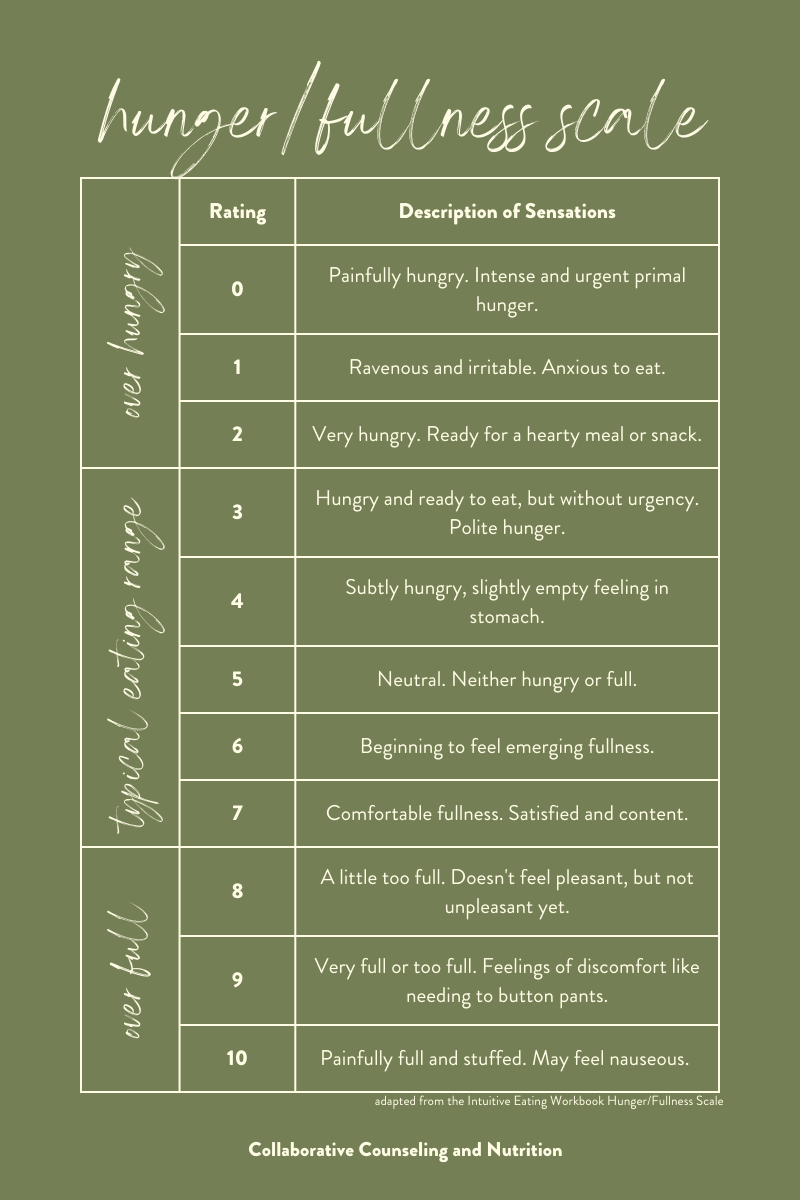5 Strategies to Honor Your Hunger
Honor your hunger. Have you heard that phrase before? Are you unsure of how exactly to go about doing that? If so, this post is for you!
Honoring Your Hunger is the second Intuitive Eating principle. If you are unfamiliar with Intuitive Eating or just need a refresher, “Intuitive Eating is a dynamic mind-body integration of instinct, emotion, and rational thought. It is the personal process of honoring your health by paying attention to the messages of your body and meeting your physical and emotional needs (Tribole & Resch, 2021). The 10 principles work together to help you remove the obstacles to body attunement and to empower you to cultivate body attunement.
The honoring your hunger principle aims to empower you to cultivate body attunement by helping you identify what hunger feels like in your body. Learning to honor this first biological signal sets the stage for rebuilding trust in yourself and in food.
The Intuitive Eating Pros remind us of the importance of keeping our body biologically fed with adequate energy and carbohydrates, stating, “once you reach the moment of excessive hunger, all intentions of moderate, conscious eating are fleeting and irrelevant.” Honoring your hunger before you become excessively hungry helps to promote conscious, intuitive eating. That said, there will likely be times when you might not be able to honor your hunger when you start to feel your cues. It’s okay! Practicing self-compassion and “for the most part” mentality, as well as utilizing the tips below can help reduce those instances.
So, how exactly can you work on honoring your hunger?
1. Learn what your hunger cues feel like in your body. If you have a history of disordered eating, an eating disorder, or identify as neurodivergent, it can be difficult to know what your hunger cues feel like in your body. And it can take time to learn how to tune into them. Some examples of what hunger cues could feel like include:
mild gurgling or gnawing in the stomach
growing noises
feeling lightheaded
faint or irritable
uncomfortable stomach pains
headache
difficulty swallowing
thoughts with food/preoccupation with food
It’s important to remember that everyone experiences hunger cues in different ways and at different times throughout the day. If you have trouble identifying your hunger cues, depending on where you are in your recovery journey, it could be helpful to jot down a few notes about bodily sensations you experience before and after meal times. We also suggest discussing this with your treatment team as they can be an invaluable, supportive resource as you work on honoring your hunger.
2. Utilize the hunger/fullness scale to help tune into your hunger level.
Some people will print off the scale or pull a picture up on their phones to help identify what they are feeling and their hunger rating, as it can be a helpful tool when you begin exploring your hunger cues. Keep in mind that your hunger rating can change on a day-to-day basis and throughout the day. Part of honoring your hunger is realizing that your levels and ratings will likely change and approaching that from a place of curiosity and acceptance, rather than judgment.
3. Stash snacks in your car, bag, and desk for fueling on the go. Sometimes you might not be able to prepare a snack or sit down for a full meal. Honoring your hunger includes thinking practically about instances when your body might ask for food. Keeping snacks readily available in the places you spend the most time can help ensure that you have fuel ready when it’s needed.
4. Keep your kitchen stocked with a variety of quick snacks and meal components that you enjoy. Remember, this will be unique to you and your preferences. This option ensures you have food readily available and can help with overthinking or decision fatigue which can sometimes occur when hungry. We understand this suggestion can be difficult based on socioeconomic status and access to preferred foods, so please adapt this suggestion to fit your lifestyle, preferences, and access.
5. Add reminders to your phone every few hours as a gentle nudge to check in with your hunger cues. Whether you are working on tuning into your hunger cues or your days are busy, reminders can be a helpful way to stop and check in with your body, and determine if you need food. Reminders can also be extremely beneficial for neurodivergent folks that may struggle with interoceptive awareness and identifying what hunger feels like in their body.
Remember, learning to identify and honor your hunger is a process.
You might not be great at it overnight; it takes practice! Every time to practice, you are collecting data that helps you understand yourself better. It can be helpful to look at honoring your hunger as an act of self-care by honoring your body’s desire for nourishment and fuel. What strategies do you find helpful to honor your hunger?
Sources:
The Original Intuitive Eating Pros. (2019, December 20). 10 Principles of. Intuitive Eating. Retrieved September 19, 2022, from http://www.intuitiveeating.org/10-principles-of-intuitive-eating/
Tribole, E., & Resch, E. (2021, June 1). The Intuitive Eating Workbook: Your Guided Journey for Nourishing a Healthy Relationship with Food (1st ed.). New Harbinger Publications.
Collaborative Counseling & Nutrition is an outpatient nutrition and body image counseling center, with locations in Indianapolis and Carmel, that provides compassionate, holistic eating disorder treatment. Through practicing mindfulness, intuition, and Health At Every Size, we are on a mission to help you find a true state of well-being! We take an anti-diet, weight-inclusive approach with all our clients and work to help guide you towards a way of healthy living designed by you, just for you! This post is for education purposes only and should not be used as a substitute for treatment for an eating disorder. If you are looking for a registered dietitian or therapist to assist you on your recovery journey, please reach out today!


